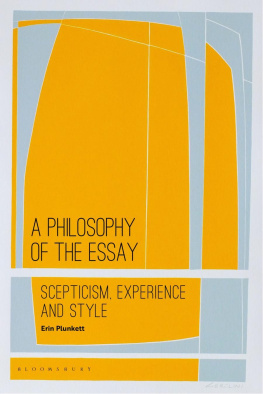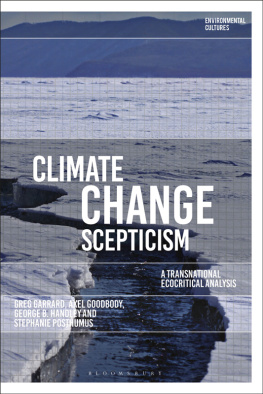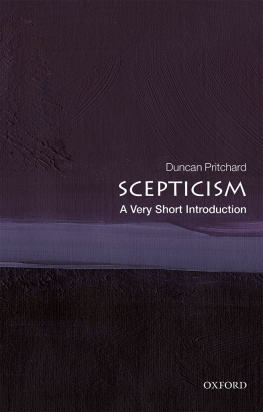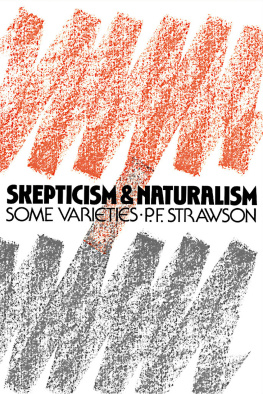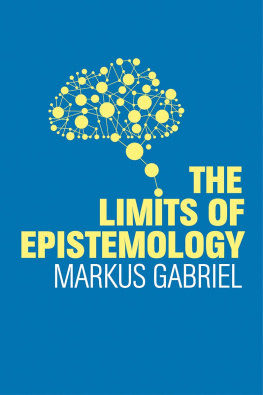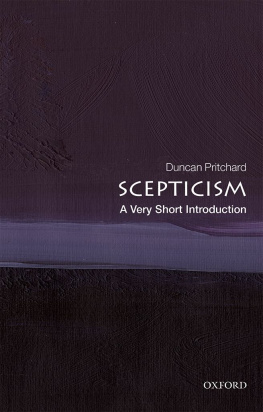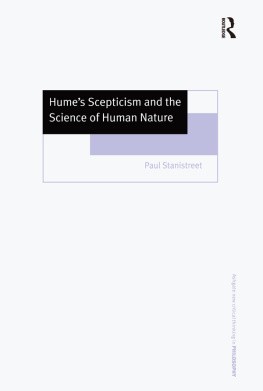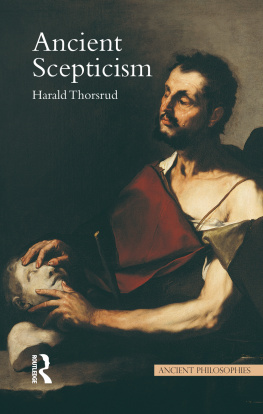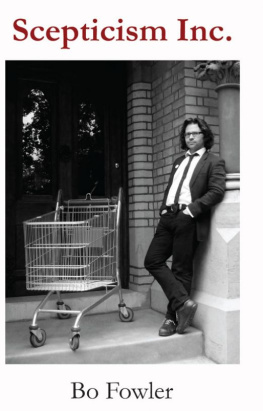
Frances, Bryan , Assistant Professor of Philosophy, Fordham University
Scepticism Comes Alive
Publication date 2005 (this edition)
Print ISBN-10: 0-19-928213-7
Print ISBN-13: 978-0-19-928213-5
doi:10.1093/0199282137.001.0001
Abstract: The nagging voice of the sceptic has always been present in epistemology. Over the last thirty years or so, philosophers have thought of several promising ways to counter the radical sceptic. For instance, facts about the reliability of cognitive processes, principles determining which possibilities must be ruled out in order to have knowledge, and principles regarding the context-sensitivity of knowledge attributions. In this research monograph, Bryan Frances presents a new argument template for generating new kinds of radical scepticism, ones that hold even if all the clever anti-sceptical fixes such as contextualism, relevant alternatives theory, and reliabilism defeat the traditional sceptic. However, the new sceptical conclusions are quite different from traditional scepticism. Although the new sceptic concludes that people don't know that fire engines are red, that people sometimes have pains in their knees, or even that people believe that fire engines are red or that knees sometimes throb, people admit that they know millions of exotic truths, such as the fact that black holes exist. One can know about the existence of black holes, but not about the colour of one's shirt or even about what one believes regarding the colour of one's shirt. The new sceptical arguments proceed in the usual way (here's a sceptical hypothesis; one can't neutralize it, one has to be able to neutralize it to know P; so one doesn't know P), but the sceptical hypotheses plugged into it are "real, live" scientific-philosophical hypotheses often thought to be actually true, such as error theories about belief, colour, pain location, and character traits. Frances investigates the questions, 'Under what conditions do we need to rule out these error theories in order to know things inconsistent with them?' and 'Can we rule them out?'
Keywords: scepticism,experts,error,belief eliminativism,contextualism,reliabilism,relevant alternatives,scientific hypothesis,knowledge,defeaters
SCEPTICISM COMES ALIVE
end p.i
end p.ii
Scepticism Comes Alive
CLARENDON PRESS OXFORD
end p.iii

Great Clarendon Street, Oxford ox2 6dp
Oxford University Press is a department of the University of Oxford.
It furthers the University's objective of excellence in research, scholarship,
and education by publishing worldwide in
Oxford New York
Auckland Cape Town Dar es Salaam Hong Kong Karachi
Kuala Lumpur Madrid Melbourne Mexico City Nairobi
New Delhi Shanghai Taipei Toronto
With offices in
Argentina Austria Brazil Chile Czech Republic France Greece
Guatemala Hungary Italy Japan Poland Portugal Singapore
South Korea Switzerland Thailand Turkey Ukraine Vietnam
Oxford is a registered trade mark of Oxford University Press
in the UK and in certain other countries
Published in the United States
by Oxford University Press Inc., New York
Bryan Frances 2005
The moral rights of the author have been asserted
Database right Oxford University Press (maker)
First published 2005
All rights reserved. No part of this publication may be reproduced,
stored in a retrieval system, or transmitted, in any form or by any means,
without the prior permission in writing of Oxford University Press,
or as expressly permitted by law, or under terms agreed with the appropriate
reprographics rights organization. Enquiries concerning reproduction
outside the scope of the above should be sent to the Rights Department,
Oxford University Press, at the address above
You must not circulate this book in any other binding or cover
and you must impose the same condition on any acquirer
British Library Cataloguing in Publication Data
Data available
Library of Congress Cataloging in Publication Data
Data available
Typeset by SPI Publisher Services, Pondicherry, India
Printed in Great Britain
on acid-free paper by
Biddles Ltd., King's Lynn, Norfolk
ISBN 0-19-928213-7 978-0-19-928213-5
01992821372
end p.iv
end p.vi
Preface
I once overheard a telling conversation between two of my colleagues. One asked the other about a new book on a topic of some importance to both of them. He asked whether they would have to do anything different because of the book. The second colleague said not, so the first colleague said he would not read the book. The conversation encapsulates an excellent test of the worth of a philosophical work: an idea is important if as a result of it experts will have to change what they do when they work on the idea's topic. It's not good enough to get it right, or to choose an important topic, or to choose a topic of contemporary interest, or to come up with something original; it isn't even enough to do all of these things. I know now that much of the work I have done, especially as a graduate student, failed that testeven work that found its way into leading philosophy journals.
However, due in part to some dumb luck, I have stumbled across what I believe to be a worthy idea, one that epistemologists cannot ignore. It is, in effect, a new kind of argument for a new kind of radical scepticism. It must be admitted that the notion of scepticism elicits strange behaviour in philosophers, especially epistemologists. Many philosophers, even contemporary ones who should know better, sometimes assert that no one is really a sceptic. Philosophers are pretty much professionally forbidden from being radical sceptics, even though we aren't forbidden from believing any of many other comparably outlandish claims (e.g., see Chapter of this essay). Scepticism is commonly, and justifiably, thought to be an epistemic pit with particularly nasty properties. If you are in that pit, so is everyone else; there is no practical way of coming out of the pit and into the light of knowledge; and you most likely have a serious cognitive or epistemic deficit, some kind of failure of your epistemic systems. But, as I will presently show, while these claims hold for traditional forms of scepticism, none of them apply to the sceptical theories I explore here. The sceptical snares that these new theories lay forth apply to just some people (e.g., many philosophers and many scientists), are caused by some pretty random sociological events, are fallen into only in adulthood, can be escaped on one's own or with the help of others, and indicate no epistemic deficit of any significance. In fact, falling into the
end p.vii
sceptical snare is actually an improvement in epistemic standing compared to most who have the knowledge denied to those in the snare. That's right: the person who knows is epistemically inferior to the person who doesn't know. If I'm not mistaken, we have an entirely new kind of scepticism.
In this essay I have restricted myself to investigating the new sceptical argument. I have discussed as little as possible traditional arguments for traditional forms of scepticism. I have not presented my best guesses as to how particular anti-sceptics will react to my new sceptical arguments. I do this not out of any disrespect, but in order to make the essay relatively short, unified, and not cumbersome. I have ignored most traditional epistemological disputes and theories. I have resisted, with effort, the temptation to blather on about my own pet peeves and ideas. I have, with the exception of this preface and a few other places, attempted to avoid the word 'I'. I have done all this in the hopes that a short book restricted to presenting the case for the new scepticism is less distracting than a long one that drifts from the main task. It's also easier to write.



